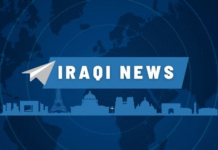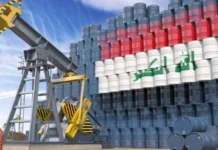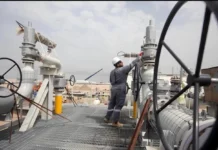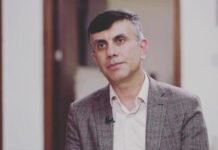Iraq Economic News and Points to Ponder Friday AM 10-6-23
“A Call For An Emergency Plan”… The Dollar In Iraq Is Entering A Dangerous Turning Point And An Unprecedented American Decision
Baghdad Today – Baghdad Professor of International Economics, Nawar Al-Saadi, said on Thursday (October 5, 2023), that the US Federal Bank refused to provide the Iraqi Central Bank with one billion dollars in cash, “a dangerous precedent that must be taken seriously by the Iraqi government.”
Al-Saadi said in a post on his Facebook page, “Enough of the drumming by the economists who drum on the channels day and night and claim that the dinar is strong and that there are strict measures.”
He added, “Now the trust between the Iraqi Central Bank and the (American) Federal Reserve has deteriorated. The Americans cannot tolerate procrastination and prevarication any longer.”
Al-Saadi stressed, “An emergency plan and comprehensive reforms must now be announced in cooperation with the Ministry of Interior to control speculators in the market, control borders, and prevent currency smuggling, otherwise undesirable consequences will happen.”
“A call for an emergency plan”… The dollar in Iraq is entering a dangerous turning point PIC
One of the advisors to the government of Muhammad Shiaa Al-Sudani had previously revealed that “the United States of America warned the Sudanese government eight times, publicly and clearly, against the continued sale of the dollar in large quantities through the currency auction window of the Central Bank.”
He said that the American side “has provided ample evidence that the majority of buyers of the dollar are smuggling it to Iran, Syria and Lebanon,” explaining that “this sale led to the monopoly of the dollar among merchants, and a decline in its presence in local and private banks.”
Last February, the Central Bank of Iraq decided to raise the value of the official exchange rate of the dinar against the dollar by 10 percent in a measure aimed at reducing the devaluation of the currency that accompanied the adoption of more stringent regulations regarding financial transfers outside the country.
The government then agreed to the Central Bank’s proposal to raise the value of the exchange rate from about 1,470 dinars to 1,300 dinars per dollar, which had a clear impact on the exchange market at that time by reducing prices that reached the level of 1,700 dinars in the parallel market.
For several months, the value of the Iraqi dinar has fluctuated sharply, losing on some days 15 percent of its value against the dollar, which sparked sporadic demonstrations by Iraqis worried about losing their purchasing power.
What made things even more unclear was after Reuters quoted the Director General of the Investment and Transfer Department at the Central Bank of Iraq, Mazen Ahmed, as saying that Iraq would ban cash withdrawals and transactions in US dollars starting from the beginning of next year and not immediately, a step that was interpreted by some experts as a “delay.” “For depositors if they want to withdraw their money.
However, the central bank official quickly issued a clarification regarding his statements to Reuters, saying that they “included inaccurate journalistic formulations.”
He said in a statement published on the Central Bank of Iraq’s Facebook page, “The Central Bank guarantees dollar deposits, and the citizen who deposited his money in dollars with any Iraqi bank previously or by 2024 has an inherent right to receive these amounts in cash and in dollars.”
He pointed out that the date of next January 1 “will be the beginning of stopping cash withdrawals for incoming remittances only from outside Iraq, according to certain arrangements that guarantee the sustainability of business and does not in any way include citizens’ balances in dollars.”
Independent MP in Parliament Hadi Al-Salami says, “The current failure in the dollar issue is borne by all the Iraqi governments that have ruled the country since 2003 until now. The government of Muhammad Shiaa Al-Sudani pledged to solve the crisis by establishing mechanisms to prevent the smuggling of hard currency, but it did not succeed in doing so.” This file.”
He pointed out, “Reforming the banking system and the dollar crisis requires controlling the currency auction, which is still selling large amounts of dollars, and we do not know where it is going,” noting that “the problem is big in Iraq, and we are facing huge challenges that may lead to a crack in the current system.” Especially since the United States of America has warned many against smuggling the dollar to neighboring countries.” Source: Baghdad Al-Youm + Agencies LINK
The Dollar Crisis Is Worsening In Iraq: Quarrels Within Private Banks
Posted On2023-10-06 By Sotaliraq Iraqis who have accounts in private banks complain of the inability to receive their money transfers that reach them from abroad in hard currency, even though they have contracts for their salaries, official books, and documents related to their companies and interests, while banks refrain from delivering dollars to Iraqis under the pretext of a government decision prohibiting the circulation of the dollar and dealing in the dinar.
Iraqi only, what observers consider the beginning of an economic crisis and a new global isolation for Iraq.
The Iraqi Council of Ministers issued a decision, last April, obligating all companies and banks to use the dinar only in their transactions, including the salaries of employees of foreign companies, which were in dollars and paid in dinars, and the official rate is 1,320 dinars, with the exception of diplomatic missions, which are paid in dollars, and in turn the bank The Iraqi Central Bank circulated this decision to the Iraqi banks to adhere to it, which implemented the decision and forced companies to receive all their incoming transfers in dinars and at the official rate, knowing that the exchange rate of the dollar in the markets is close to 1,600 Iraqi dinars.
Representative and member of the “Al-Basas” coalition, Hussein Arab, published a video clip on his account on the “X” platform (formerly Twitter), showing Iraqis angry that they had not received sums of money allocated to them in dollars, but the banks were refraining from giving them dollars.
He wrote: “The acquisition by a non-local private bank of the amounts of financial transfers via the electronic dollar platform, estimated at 70% of Iraq’s transfers, is abnormal and disastrous. We will have a clear position on manipulating the fate of the country’s economy. We will not remain silent.”
For his part, the independent representative in the Iraqi parliament, Hadi Al-Salami, said, “The current failure in the US dollar issue is borne by all the Iraqi governments that have ruled the country since 2003 until now, and the government of Muhammad Shiaa Al-Sudani has pledged to solve the crisis by establishing mechanisms to prevent currency smuggling.” It was difficult, but it did not succeed in this file.”
Al-Salami added, in an interview with Al-Araby Al-Jadeed, that “reforming the banking system and the dollar crisis requires controlling the currency auction, which is still selling large quantities of dollars, and we do not know where it goes,” noting that “the problem is big in Iraq, and we are facing challenges.” Huge amounts that may lead to a crack in the current system, especially since the United States of America has often warned against smuggling the dollar to neighboring countries.”
According to an advisor to the Sudanese government, “The United States of America warned the Sudanese government eight times, publicly and clearly, against the continued sale of the dollar in large quantities through the currency auction window of the Central Bank, and it provided ample evidence that the majority of buyers of the dollar are smuggling it to Iran, Syria, and Lebanon.”
He explained to Al-Araby Al-Jadeed that “this sale led to the monopoly of the dollar among merchants, and its presence in local and private banks declined.”
Reuters also quoted the Director General of Investment and Transfers at the Central Bank of Iraq, Mazen Ahmed, as saying that “Iraq will ban cash withdrawals and transactions in US dollars as of January 2024,” considering that “the ban is the latest campaign to limit the misuse of Iraq’s currency reserves.” Hard currency in financial crimes and evading US sanctions on Iran.”
But the researcher in economic affairs in Iraq, Wissam al-Jubouri, pointed out that “the government’s continued failure to deal with the dollar file, and depriving Iraqis of receiving their salaries and managing their economic and commercial affairs, is pushing them to leave Iraq, and will lead to discouraging financial transfers from abroad in the future.” .
He confirmed to Al-Araby Al-Jadeed that “all recent government decisions are in line with smugglers, and do not serve the Iraqi economy. Rather, they lead to weak financial dealings between Iraq and the countries of the region and the world.”
Earlier, American officials confirmed that Washington had imposed sanctions on 14 Iraqi banks by preventing them from conducting transactions in dollars, as part of a comprehensive campaign to combat the leakage of American currency to Iran, considering that banks and exchange companies were able to achieve huge profits from their transactions in dollars, through the use of operations. Fraudulent import.
The US sanctions included the banks “Al-Mashashar, Al-Qartas, Al-Tayef, Elaf, and Erbil, in addition to the International Islamic Bank, Trans-Iraq Bank, Mosul, Al-Rajeh, Sumer, Al-Thiqah, Or, Al-Tayef, Al-Alam, and Zain Iraq,” and according to Iraqi sources, these banks are affiliated with religious parties, militias, and armed factions loyal to Iran.
Over the past years, an average of $170 million was sold daily through what is known as the dollar auction, in which merchants, banks, and companies participate, without monitoring the end of that money, which is classified as import trade for the local market in most cases, or foreign transfers, knowing that The actual need for dollars in the markets and among merchants does not exceed $50 million per day, according to experts. LINK
Advisor To Sudanese: Al-Faw Port Will Operate At Full Capacity During 2025
Reconstruction and building Economy News – Baghdad Advisor to the Prime Minister for Transport Affairs, Nasser Al-Asadi, confirmed that Al-Faw Port will operate at full capacity during the year 2025, while he indicated the development of a metro plan that would cover 80% of Baghdad’s area.
Al-Asadi said: “We have reached 80 percent completion of Al-Faw Port, and the port will operate at full capacity during 2025.”
He added, “A general strategy for operating Al-Faw Port will be developed soon, as we began preparing for the port’s operating phase this week.”
In a separate context, Al-Asadi said: “We have developed a metro plan that covers 80% of Baghdad’s area.” Views 61 10/06/2023 – https://economy-news.net/content.php?id=36817
Iraq And Turkmenistan Are Discussing Signing A Memorandum Of Understanding To Supply Gas
Energy Economy News – Baghdad On Thursday, the Minister of Electricity, Ziyad Ali Fadel, received the Minister of State of Turkmenistan for Gas Affairs, Babayev, at Baghdad International Airport, and they discussed signing a bilateral memorandum.
The ministry stated in a statement, “Minister of Electricity Ziyad Ali Fadel received Turkmenistan’s Minister of State for Gas Affairs, Babayev, and his accompanying delegation, at Baghdad International Airport.”
She added, “The visit is official to discuss prospects for joint cooperation between the two countries, and to prepare for signing a memorandum of understanding to supply gas to power stations.”
Views 82 10/05/2023 – https://economy-news.net/content.php?id=36815
Ceyhan Oil Line.. Türkiye Seeks To Force Iraq To Concede, While The Region Stands By And Watches
Information / Baghdad… A member of the anti-Turkey Tafakri Azadi movement, Luqman Hassan, confirmed that Turkey is seeking to drag Iraq towards giving up its lawsuits against it, especially with regard to oil export funds and the fine imposed on it by the Paris court.
Hassan told Al-Maalouma, “The Kurdistan Democratic Party and the leaders in this party do not lack anything in terms of life related to power, economy, and security, and therefore their situation is normal, whether by exporting oil through Turkey or continuing to stop it.”
He added, “Turkey is seeking to pump oil at the expense of its opponents, represented by the Iraqi government and the Shiite parties, by responding to its demands to waive the Paris court case and the fine imposed on it, amounting to one billion and 500 million dollars.”
He stated that “Turkey is seeking to drag Iraq towards giving up its calls towards it, especially since there are calls after 2018 until 2023, and the Iraqi government has the right to file a lawsuit to demand Turkey’s funds for exports in this period and before.” LINK
Points to Ponder on the Power of Words:
Half the world is composed of people who have something to say and can’t, and the other half who have nothing to say and keep on saying it — Robert Frost
It is unwise to be too sure of one’s own wisdom — It is healthy to be reminded that the strongest might weaken and the wisest might err – Mahatma Gandhi
A man cannot speak but he judges and reveals himself — With his will or against his will – he draws his portrait to the eye of others by every word — Every opinion reacts on him who utters it — Emerson






